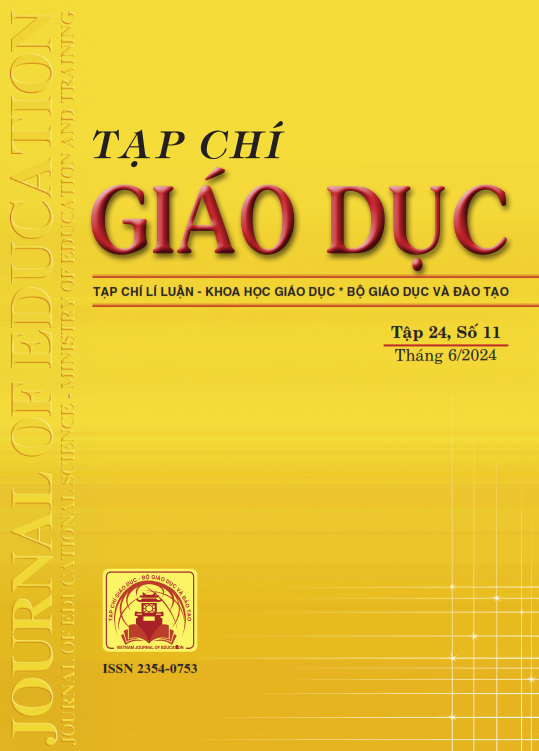Mối quan hệ giữa sự hài lòng và gắn kết trong công việc của đội ngũ giảng viên Đại học Huế
Tóm tắt
Lecturers have a decisive role in ensuring the quality of education and training. In order for university lecturers to perform their role properly and to maintain their security while working at higher education institutions, they must feel satisfied in their work. Therefore, this article aims to understand the relationship between job satisfaction and work engagement of Hue University lecturers. The research data were collected from survey results of 539 lecturers of 8 member universities of Hue University and processed using SPSS 22.0 statistical software. The results show that managers, colleagues, salary, and work benefits affect the initiative and dedication of Hue University lecturers. Managers, colleagues, and work itself rather than salary affect the professional passion of Hue University lecturers.
Tài liệu tham khảo
Bernstein, I. H., Nunnally, J. C. (1994). Psychometric Theory, 3rd ed. New York: McGraw-Hill.
Bộ GD-ĐT (2020). Quy chế tổ chức và hoạt động của đại học vùng và các cơ sở giáo dục đại học thành viên, ban hành kèm theo Thông tư số 10/2020/TT-BGDĐT ngày 14/5/2020 của Bộ trưởng Bộ GD-ĐT).
Chính phủ (2019). Nghị định số 99/2019/NĐ-CP ngày 30/12/2019 quy định chi tiết và hướng dẫn thi hành một số điều của Luật sửa đổi, bổ sung một số điều của Luật Giáo dục đại học.
Christian, M. S., Garza, A. S., & Slaughter, J. E. (2011). Work engagement: A quantitative review and test of its relations with task and contextual performance. Personnel Psychology, 64(1), 89-136.
De Nobile, J. J., & McCormick, J. (2005). Job satisfaction and occupational stress in catholic primary schools. In Annual Conference of the Australian Association for Research in Education, Sydney, Australia (Vol. 27).
Đại học Huế (2023). Báo cáo thường niên, tháng 12/2023.
Kahn, W. A. (1990). Psychological conditions of personal engagement and disengagement at work. Academy of Management Journal, 33(4), 692-724.
Kahn, W. A. (1992). To be fully there: Psychological presence at work. Human relations, 45(4), 321-349.
Quốc hội (2018). Luật sửa đổi, bổ sung một số điều của Luật Giáo dục đại học. Luật số 34/2018/QH14, ban hành ngày 19/11/2018.
Rai, S. (2017). Path model analysis of perceived organizational support, job satisfaction and turnover intention: Study on Indian generation Y employees. In Advances in Human Factors, Business Management, Training and Education: Proceedings of the AHFE 2016 International Conference on Human Factors, Business Management and Society (pp. 405-417). Springer International Publishing.
Rothbard, N. P. (2001). Enriching or depleting? The dynamics of engagement in work and family roles. Administrative Science Quarterly, 46(4), 655-684.
Saks, A. M. (2006). Antecedents and consequences of employee engagement. Journal of Managerial Psychology, 21(7), 600-619.
Schaufeli, W. B., Salanova, M., González-Romá, V., & Bakker, A. B. (2002). The measurement of engagement and burnout: A two sample confirmatory factor analytic approach. Journal of Happiness Studies, 3, 71-92.
Shila, J. M., & Sevilla, A. V. (2015). The influence of teachers' job satisfaction on their organizational commitment: An Indian context. International Journal of Education and Management Studies, 5(1), 53.
Shuck, B., Reio Jr, T. G., & Rocco, T. S. (2011). Employee engagement: An examination of antecedent and outcome variables. Human Resource Development International, 14(4), 427-445.
Smith, P. C., Kendall, L. M., & Hulin, C. L. (1969). The Measurement of Satisfaction in Work and Retirement. Chicago: Rand McNally.
Spector, P. E. (1997). Job satisfaction: Application, assessment, causes, and consequences (Vol. 3). Sage.
Hoàng Trọng, Chu Nguyễn Mộng Ngọc (2005). Phân tích dữ liệu nghiên cứu với SPSS. NXB Thống kê
Tải xuống
Đã Xuất bản
Cách trích dẫn
Số
Chuyên mục
Giấy phép

Tác phẩm này được cấp phép theo Ghi nhận tác giả của Creative Commons Giấy phép quốc tế 4.0 .












